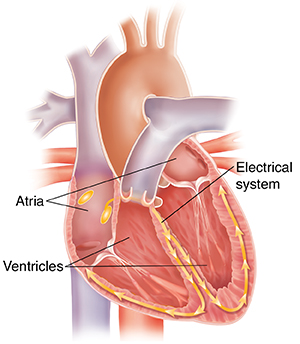Understanding First-Degree Heart Block
Heart block is a condition that occurs when the electrical system of the heart does not work correctly. This causes a slow heartbeat. In a normally working heart, an electrical signal is sent out with every heartbeat. The signal goes from the heart's upper chambers (atria) to the lower chambers (ventricles). With heart block, the electrical activity is delayed or blocked as it passes through the heart. There are different types of heart block. Some are more serious than others. They are classified by degrees.
First-degree heart block is a condition where the heart's wiring is slow to send electrical signals. But all of the signals pass through the heart successfully. There is no actual blockage. But the signal from the atria to the ventricles is slowed or delayed. It often does not cause problems. It generally does not need treatment.

What causes first-degree heart block?
First-degree heart block may be caused by:
-
Getting older
-
Damage to the heart from surgery
-
Damage to the heart muscle from a heart attack or other heart muscle problems
-
Low thyroid levels
-
Electrolyte abnormalities
-
Inflammatory or infectious heart conditions
-
Other diseases, such as rheumatic fever and sarcoidosis
-
Some medicines
Well-conditioned athletes may also develop first-degree heart block from heart changes caused by exercising a lot. This is considered normal. Some babies are born with heart block. Heart block may also run in families.
What are the symptoms of first-degree heart block?
First-degree heart block often does not have any symptoms. It may be found when your healthcare provider is checking you for some other reason.
In more severe cases, people may be uncomfortably aware of the heartbeat. Or they may feel more tired.
How is first-degree heart block treated?
First-degree heart block often doesn’t need treatment. Your healthcare provider may ask you to have regular follow-up visits. You may also be asked to take your own pulse and be alert to changes in your heart rate.
What are possible complications of first-degree heart block?
In rare cases, a first-degree heart block may turn into a more serious type of heart block that results in slower heartbeats. This may cause symptoms. You may need a pacemaker.
When should I call my healthcare provider?
Call your healthcare provider right away if you have any of these:
-
Abnormal tiredness
-
Shortness of breath
-
Decreased exercise capacity
-
Weakness, dizziness, or fainting
-
Confusion
Online Medical Reviewer:
Anne Clayton APRN
Online Medical Reviewer:
Stacey Wojcik MBA BSN RN
Online Medical Reviewer:
Steven Kang MD
Date Last Reviewed:
5/1/2022
© 2000-2024 The StayWell Company, LLC. All rights reserved. This information is not intended as a substitute for professional medical care. Always follow your healthcare professional's instructions.